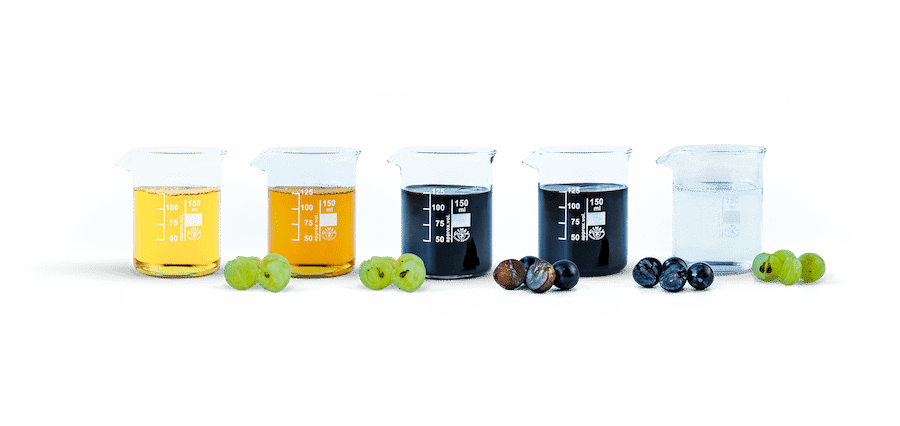The medicinal value of grapevines, grapes and the juices of ripe grapes have been recognised and used since ancient times to treat various conditions, such as liver disease, cholera and constipation. For example, in ancient Greece, a drink of honey plus unfermented grape juice (oenomel) was created to treat gout and other nervous disorders. Today, grape juice is one of the components of resveratrol supplements. Even commercial cosmetic brands use grape juice concentrate as a key ingredient in products such as anti-ageing creams and firming serums.
To get to know all these benefits, we share in this post the most important healthy facts about white and red grape juice and explain how it benefits the body.
- Grape juice: nutritional facts
- Main health benefits of grape juice
- Grape juice vs. wine
- White and red grape juice, 100% authentic and organic
Grape juice: nutritional facts
Grape juice is a non-fermented, non-alcoholic drink with a characteristic colour, aroma and flavour, depending on the grape variety from which it is made. It has been widely studied for years, due to its positive effects on the human organism. The nutritional profile of grape juice contains vitamins, minerals, antioxidants and biologically active substances that have the ability to influence natural processes in the body and offer health benefits.
- The main polyphenols present in grape juice are anthocyanins, flavonols, flavanols, resveratrol and phenolic acids. They are antioxidant compounds that prevent cell damage and promote the body’s anti-inflammatory capacity. In addition, these polyphenols are bioactive compounds that balance the intestinal microbiota.
- Grape juice contains natural sugars: glucose and fructose. They are found in an equal 1:1 ratio and are therefore easily metabolised. When consumed in moderation, these sugars provide the body with energy and nutrients. For example, glucose is essential for the proper functioning of the brain and heart.
- The vitamins and minerals provided by grape juice are mainly the following
- Vitamins: A, B1, B2, C and E.
- Minerals: calcium, potassium, magnesium, manganese and phosphorus.
Main health benefits of grape juice

All the nutrients and beneficial compounds in grape juice help, in one way or another, to promote health. Of course, its intake should be moderate, without excess. Grape juice can control hypertension, help with digestive problems, delay ageing, prevent the appearance of cancer cells, etc. Each of these benefits are described below:
Heart protection
Some of the healthful facts about grape juice reveal its cardioprotective capacity:
- The polyphenols present in grape juice attenuate the development of atherosclerosis (accumulation of fat, cholesterol and other substances in the walls of the arteries) and are associated with a reduced risk of cardiovascular disease.
- The flavonoids in grape juice can reduce inflammation of blood vessels and act as a relaxant of the arteries (vasodilation).
- Supplementation with grape juice helps control blood pressure.
Blood glucose monitoring
One of the main causes of diabetes mellitus is oxidative stress, a process generated by an excess of free radicals (molecules produced daily by the body) and a lack of antioxidants to counteract this process. Faced with this situation:
- Grape juice provides the body with powerful antioxidants, such as anthocyanins, flavonols, proanthocyanidins, phenolic acids and resveratrol, which help eliminate free radicals that cause inflammation of pancreatic cells.
- Grape juice reduces the symptoms of insulin resistance.
- Defatted soya flour enriched with grape polyphenols is a novel ingredient for creating food products that are high in protein, low in sugar and very useful for managing diabetes.
It is important to clarify that these health facts are from grape juices with no added sugars. The addition of sugar may reduce the benefits.
Cancer prevention
Both whole grapes and grape juice have a cancer-preventive effect. Although extensive clinical studies have yet to be conducted, the phytochemicals present in grape juice help to prevent cancer:
- Inhibit DNA damage.
- Stop the growth of colon cancer cells.
- Control side effects of chemotherapy, such as vomiting and nausea.
According to publications by the US National Institutes of Health NIH, one of the world’s leading scientific research centres, phenolic compounds in grape juice significantly inhibited carcinogen-induced DNA modifications in rat models. They also inhibited DNA synthesis in breast cancer cells.
Promotes intestinal health

The polyphenols in grape juice are important bioactive compounds that help balance the gut microbiota. They act as probiotics that:
- Protect the gut.
- Promote the growth of beneficial intestinal bacteria to improve assimilation and digestion.
- Inhibit the growth of pathogenic intestinal bacteria.
- Help prevent intestinal inflammation and colon cancer.
- Protect the body from intestinal infections, thanks to their antimicrobial capacity.
Skin protection
Grape juice has important anti-ageing, anti-wrinkle and anti-bacterial properties. Grape juice is a source of vitamin C (ascorbic acid), resveratrol, flavonoids and malic acid, which gives it important anti-ageing, anti-wrinkle and anti-bacterial properties:
- Prevent skin cell degradation.
- Repair and brighten the skin.
- Exfoliate the superficial layers of the dermis.
Improving memory in older adults
Grape juice supplementation may improve memory in older adults with mild cognitive impairment. Grape juice contains polyphenols with antioxidant and anti-inflammatory properties that reduce inflammation and blood pressure. In addition, flavonoids specifically are associated with a reduced risk of dementia.
More comprehensive research needs to be established to assess the full potential of this benefit. But controlled trials, published by the National Institutes of Health NIH, indicate that 12 weeks of grape juice supplementation significantly improved verbal learning and, to a lesser extent, improved verbal and spatial recall in older adults.
Prevention of viral infections
The resveratrol in grapes and grape juice has the ability to inhibit the production of viral proteins, enabling it to prevent the reproduction of influenza (flu) viruses. Its significant antiviral or inhibitory effect extends to a number of human pathogenic viruses, such as HSV, Epstein-Barr virus and poliovirus.
Grape juice vs. wine

Red wine, always consumed in moderation, is considered heart-healthy because of the alcohol and antioxidants it contains, mainly resveratrol. But both wine and grape juice come from the same source, so they share multiple health-promoting bioactive compounds, the amount of which differs slightly. Among these shared compounds is resveratrol. So it is possible to get some of the same heart benefits from grape juice as from red wine.
- According to the Mayo Clinic, an American organisation dedicated to research, clinical practice and medical education, it is possible to consume resveratrol (a powerful antioxidant) without drinking alcohol by simply drinking grape juice.
White and red grape juice, 100% authentic and organic
Grape juice concentrate made from grapes grown under an organic farming system, without pesticides and chemical fertilisers, contains higher amounts of phenolic compounds, such as resveratrol and anthocyanins, compared to grape juices from conventional farming practice. Therefore, organic white and red grape juices can be used as reliable sources of nutrients and antioxidants.
At Julián Soler we produce and export 100% authentic and organic red and white grape juice concentrate. Our process is unique, we have designed it to guarantee maximum quality and food safety and to preserve the colourings, sugars, acids, nutrients and antioxidants of the grape. Our product is free of additives, preservatives and allergens, it is CO2-free virgin grape juice. Specially designed to satisfy the most demanding consumers.
We have a laboratory equipped with state-of-the-art technology to control the quality of the raw material we receive and the white and red must we produce. With all this technological capacity, together with our R&D department, we support our customers in the research and development of functional and innovative products based on grape juice.
At Julián Soler we have more than 50 years producing white and red concentrated grape juices. Contact us and we will deliver our product to any point of the 5 continents.
Sources of reference used:
NLM (National Library of Medicine de NIH), Mayo Clinic, SciELO, Julián Soler, MDPI (Multidisciplinary Digital Publishing Institute)




 by
by